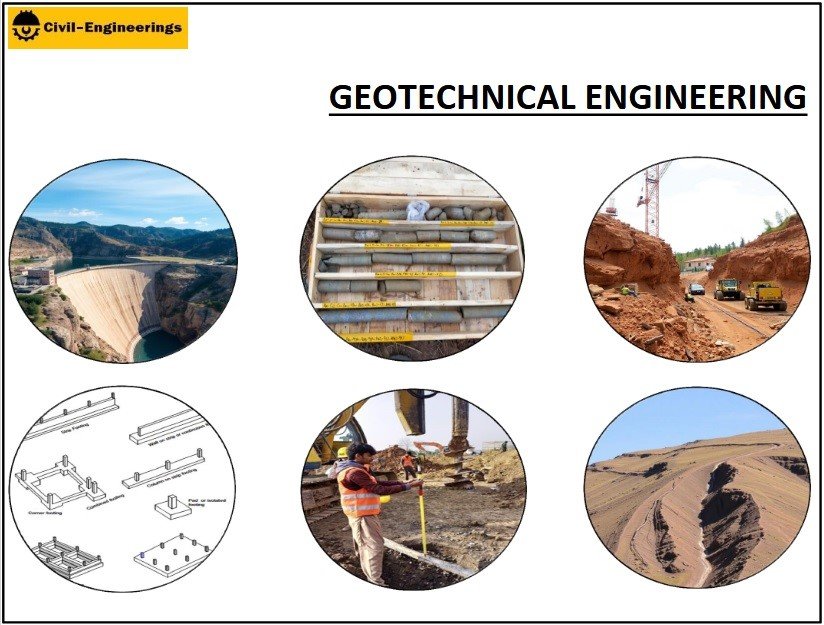Some Known Factual Statements About Geotechnical Engineering For Construction Projects
Table of ContentsThe Geotechnical Engineering For Construction Projects DiariesNot known Factual Statements About Geotechnical Engineering For Construction Projects How Geotechnical Engineering For Construction Projects can Save You Time, Stress, and Money.The 7-Second Trick For Geotechnical Engineering For Construction ProjectsUnknown Facts About Geotechnical Engineering For Construction ProjectsThe Best Strategy To Use For Geotechnical Engineering For Construction Projects
The role of geotechnical design significantly deals with realizing the features of soil and rock, which might vary substantially by their thickness, moisture web content etc. These features should be examined by geotechnical designers to forecast their activities under different circumstances. The safety and security in addition to stability of frameworks are impacted by soil conditions, making this analysis essential., in addition to just how they interact with buildings that have actually been erected on or within them, is one of the key explanations for why geotechnical engineering is crucial.
Along with structural planning and building, geotechnical design is additionally vital to the repair and maintenance of pre-existing structures. Age-related degradation or extra problems could impact a framework's stability and efficiency. Environmental defense is accomplished through geotechnical engineering. Competence in air, water, and dirt top quality maintenance is put to utilize by geotechnical designers to decrease the adverse results of projects.
To sum up, geotechnical engineering is an essential self-control that protects the durability and integrity of civil framework. Geotechnical engineers contribute to making structure projects reliable all over the world by comprehending the behavior of planet materials and using appropriate planning methods.
The Greatest Guide To Geotechnical Engineering For Construction Projects
The foundational security of any job is necessary. Geotechnical engineering plays a crucial duty in ensuring that structures are built on strong ground, essentially and figuratively. By examining soil, rock, and subsurface problems, geotechnical designers supply essential insights that aid in the design, construction, and maintenance of structures and facilities.

The Basic Principles Of Geotechnical Engineering For Construction Projects
Laboratory testing: Identifying the buildings of dirt and rock. Area screening: Performing tests on-site to evaluate problems. Evaluation and style: Utilizing data to make structures, preserving wall surfaces, tunnels, and various other structures. Several high-profile building and construction tasks have actually effectively utilized geotechnical design to ensure their security and security. :: The globe's tallest structure called for a deep understanding of the underlying geology.

As a leader in geotechnical engineering, BECC Inc. is committed to providing innovative and efficient solutions visit this web-site that meet the greatest standards of top quality and safety and security. For more details on exactly how BECC Inc. can sustain your following construction task, contact us today and allow us help you construct on solid ground.
William Rankine, a designer and physicist, created a different to Coulomb's earth stress theory. Albert Atterberg established the clay uniformity indices that are still utilized today for dirt Read More Here classification. In 1885, Osborne Reynolds acknowledged that shearing causes volumetric extension of dense products and tightening of loose granular materials. Modern geotechnical engineering is stated to have actually begun in 1925 with the publication of Erdbaumechanik by Karl von Terzaghi, a mechanical designer and geologist.
Some Known Questions About Geotechnical Engineering For Construction Projects.
Terzaghi additionally created the framework for concepts of birthing capability of foundations, and the concept for prediction of the price of negotiation of clay layers because of loan consolidation. After that, Maurice Biot totally established the three-dimensional soil debt consolidation theory, extending the one-dimensional model previously created by Terzaghi to extra general theories and presenting the set of basic formulas of Poroelasticity.
Geotechnical designers explore and establish the residential properties of subsurface problems and materials. They additionally create matching earthworks and maintaining frameworks, tunnels, and framework structures, and may supervise and review sites, which might additionally include site surveillance in addition to the danger evaluation and reduction of all-natural risks - Geotechnical Engineering for Construction Projects. Geotechnical engineers and engineering rock hounds perform geotechnical examinations to acquire information on the physical properties of dirt and rock underlying and beside a website to design earthworks and structures for proposed frameworks and for the fixing of distress to earthworks and frameworks triggered by subsurface conditions.
What Does Geotechnical Engineering For Construction Projects Do?
Geologic mapping and interpretation of geomorphology are typically completed in assessment with a geologist or engineering geologist. Subsurface exploration generally entails in-situ testing (for instance, the common infiltration examination and cone infiltration examination). The digging of test pits and trenching (particularly for finding mistakes and slide airplanes) may also be used to find out about soil conditions at deepness. Still, they are often made use of to permit a rock hound or designer to be lowered right into the borehole for straight visual and hand-operated exam of the dirt and rock stratigraphy. Different soil samplers exist to satisfy the needs of various design projects. The common infiltration test, which makes use of a thick-walled split spoon sampler, is one of the most common way to accumulate disrupted samples.

Normally, the user interface's precise geometry is unidentified, and a simplified user interface geometry is assumed. Limited slopes need three-dimensional versions to be evaluated, so most inclines are evaluated thinking that they are infinitely large and can be stood for by two-dimensional designs.
Geotechnical Engineering For Construction Projects Fundamentals Explained
Creating the layout based on a functioning hypothesis of behavior read more prepared for under the most possible problems. Option of amounts to be observed as building earnings and calculating their prepared for values based on the working hypothesis under the most negative problems.
Measurement of amounts and evaluation of real conditions. Design alteration per real conditions The observational technique appropriates for building that has already started when an unexpected growth happens or when a failure or accident looms or has actually already happened. It is inappropriate for tasks whose style can not be altered throughout building and construction.
Comments on “The 7-Second Trick For Geotechnical Engineering For Construction Projects”